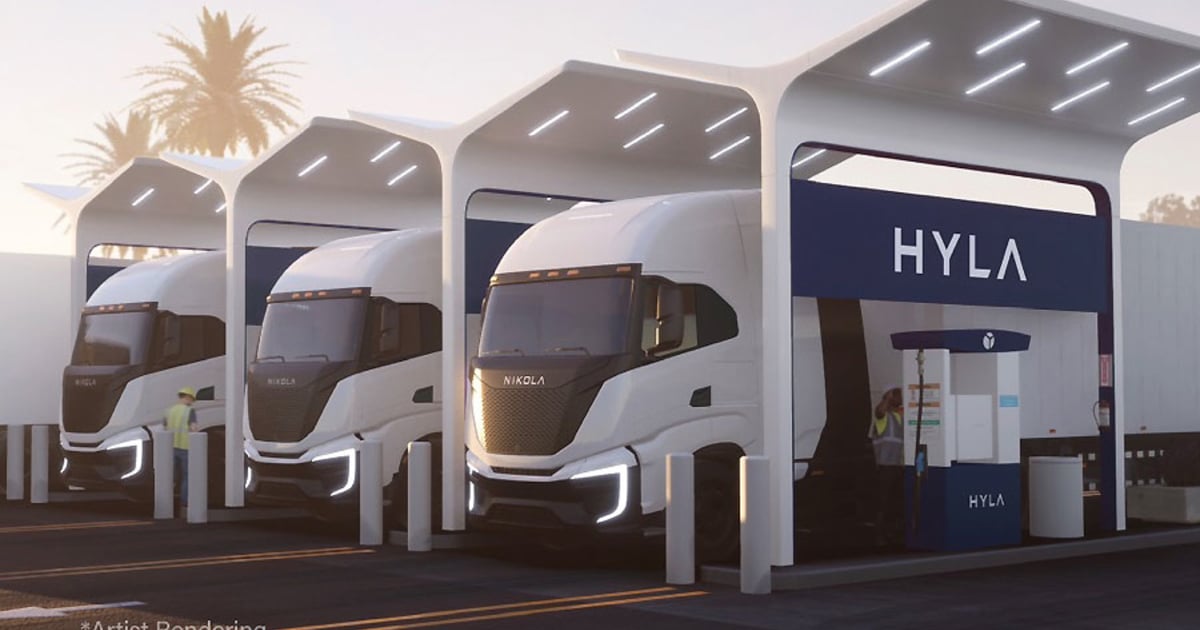
Nikola Corp. took a step toward stabilizing its finances Thursday after winning approval to issue new shares to raise capital.
The ability to issue new shares added to Nikola’s momentum in recent weeks, including winning critical grants to build out its hydrogen fueling network and booking new orders, including one from a large trucking company.
The approval was “critical for continued growth and success as we move forward with our strategic priorities, including autonomous technologies and software, our HYLA hydrogen ecosystem and the recent launch of the Nikola hydrogen fuel cell electric vehicle,” said Michael Lohscheller, Nikola’s CEO.
The Phoenix commercial fuel cell and electric truck maker has tried twice to get shareholders to approve issuing new stock only to fail to reach the required majority of all shareholders to move forward. But a change in Delaware corporate regulations on Tuesday allowed it to move forward.
The new regulation requires only a majority of shareholders to vote for approval instead of all shareholders.
Nikola can now move ahead with its proposal to double its outstanding shares to 1.6 billion from 800 million. Issuing new shares to raise funds is critical for its pivot to producing hydrogen fuel cell trucks and building out HYLA, its hydrogen production and distribution network.
The company’s stock price has rallied as it has made headway in recent weeks. Nikola’s share closed at $3.40 on Thursday, a 534 percent increase since closing at a one-year low of 54 cents on June 6.
On Monday, Nikola announced it won an order for 13 zero-emission Class 8 trucks from J.B. Hunt Transport Services, one of the nation’s largest motor carriers. The order covers 10 battery-electric big rigs and three hydrogen fuel cell trucks. And Bosch said last month that it has started production of the fuel cells for Nikola’s trucks.
The trucking company plans to use the tractors along key trucking routes in the greater Los Angeles and Phoenix areas. Nikola’s hydrogen arm, HYLA, will supply the hydrogen and fueling infrastructure.
“These zero-emission trucks from Nikola advance our progress towards achieving our ambitious goal to reduce carbon emission intensity through viable solutions,” said Nick Hobbs, chief operating officer and president of contract services at J.B. Hunt.
J.B. Hunt operates a fleet of 21,000 trucks and is ordering handfuls of zero-emission vehicles from various manufacturers as part of a goal to slash carbon emissions by 32 percent from a 2019 baseline by 2034.
Nikola said Wednesday that it had surpassed 200 sales orders for its Class 8 hydrogen fuel cell tractors. The order book represents 18 customers.
On Tuesday, Nikola said it had won an additional $16.3 million in environmental agency grants to develop seven open-network hydrogen refueling stations. It has obtained a combined $58.2 million from California agencies for the stations.
The company is working with charging and fueling infrastructure company Voltera to develop up to 50 stations in North America over the next five years that will operate under HYLA.
“Building an integrated, hydrogen ecosystem to support hydrogen fuel cell electric truck deployment and creating a scalable energy business is a top priority for us,” said Carey Mendes, president of Nikola Energy.
The commercial vehicle company is following a strategy pioneered by Tesla with electric cars. Tesla built its own charging network because, at its launch, there were almost no places for an EV to charge. Similarly, Nikola is building a fueling structure so its customers will have access to hydrogen.
Nikola’s strategy is to build a network of commercial hydrogen refueling stations in California and expand eventually throughout North America with locations on the major trucking routes.